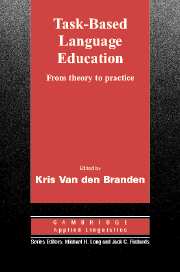Book contents
- Frontmatter
- Contents
- Acknowledgements
- Series Editors' Preface
- Chapter 1 Introduction: Task-based language teaching in a nutshell
- Chapter 2 From needs to tasks: Language learning needs in a task-based approach
- Chapter 3 Tasks for absolute beginners and beyond: Developing and sequencing tasks at basic proficiency levels
- Chapter 4 Developing language tasks for primary and secondary education
- Chapter 5 Task-based language teaching in science education and vocational training
- Chapter 6 Task-based language teaching and ICT: Developing and assessing interactive multimedia for task-based language teaching
- Chapter 7 Developing and introducing task-based language tests
- Chapter 8 The role of the teacher in task-based language teaching
- Chapter 9 A box full of feelings: Promoting infants' second language acquisition all day long
- Chapter 10 Training teachers: Task-based as well?
- References
- Subject Index
- Name Index
Chapter 5 - Task-based language teaching in science education and vocational training
Published online by Cambridge University Press: 05 May 2010
- Frontmatter
- Contents
- Acknowledgements
- Series Editors' Preface
- Chapter 1 Introduction: Task-based language teaching in a nutshell
- Chapter 2 From needs to tasks: Language learning needs in a task-based approach
- Chapter 3 Tasks for absolute beginners and beyond: Developing and sequencing tasks at basic proficiency levels
- Chapter 4 Developing language tasks for primary and secondary education
- Chapter 5 Task-based language teaching in science education and vocational training
- Chapter 6 Task-based language teaching and ICT: Developing and assessing interactive multimedia for task-based language teaching
- Chapter 7 Developing and introducing task-based language tests
- Chapter 8 The role of the teacher in task-based language teaching
- Chapter 9 A box full of feelings: Promoting infants' second language acquisition all day long
- Chapter 10 Training teachers: Task-based as well?
- References
- Subject Index
- Name Index
Summary
There is a considerable body of empirical evidence showing that the complexity of the language used by science teachers in primary and secondary education and by vocational instructors in adult education is ill-adapted to their students' level of language proficiency (Bogaert, 2001; Geudens & Rymenans, 1992; Gunstone & Watts, 1998; Hodson, 1998; Lemke, 1990; Valdes, 2004). It is claimed that particularly for learners who have a poor command of academic or technical language or for non-native speakers of the medium of instruction, teachers' language has been an ‘obstacle’ to learning, rather than an efficient medium of instruction. As a result, the learners involved fail to acquire target skills and target subject knowledge. Ultimately, this linguistic problem contributes to the fact that for these learners education fails to foster their personal development and emancipation, to raise their chances of success in higher and adult education and to feed their aspirations for better jobs (Mawer, 1999).
In this chapter, we will describe promising pedagogical approaches that have been associated with terms such as ‘Content-based instruction’ (Mohan, 1986; Snow & Brinton, 1997; Stoller, 2004) and ‘Language across the curriculum’ (Corson, 1987) and that have been introduced in an attempt to cope with this ‘linguistic’ problem of subject teaching. In this chapter we are particularly interested in the potential of task-based teaching to overcome some of the problems posed.
- Type
- Chapter
- Information
- Task-Based Language EducationFrom Theory to Practice, pp. 106 - 128Publisher: Cambridge University PressPrint publication year: 2006
- 2
- Cited by

